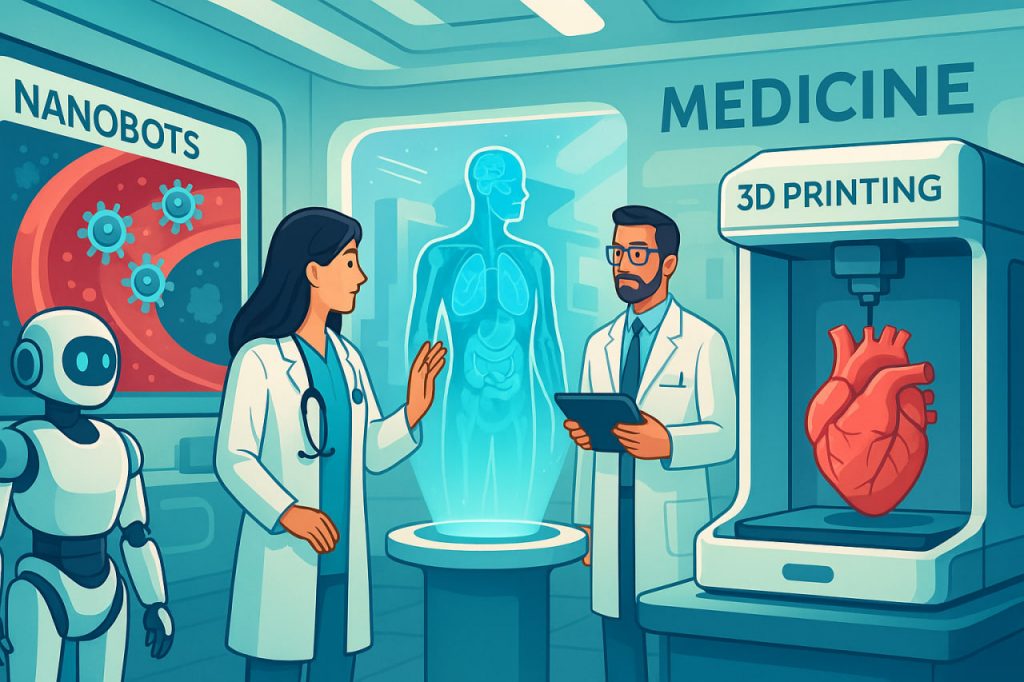Medicine is on the verge of a revolution that will transform how we prevent, diagnose, and treat diseases. The medicine of the future will not only cure illnesses but also predict and prevent them before they begin. Artificial intelligence, genetic engineering, nanotechnology, and bioprinting are already reshaping healthcare into a field where every patient receives personalized treatment based on their unique biology. The future of medicine promises a world where longevity, precision, and humanity merge to create a new era of well-being.
Artificial Intelligence and Predictive Healthcare
Artificial intelligence (AI) is set to become the backbone of future medicine. By analyzing enormous amounts of data—from medical records to genetic profiles—AI can detect diseases years before symptoms appear. Machine learning algorithms can already identify early signs of cancer on scans more accurately than human radiologists. In the near future, smart systems will continuously monitor our health through wearable devices, predicting heart attacks, diabetes risks, or infections in real time. Personalized AI assistants may soon guide us toward healthier lifestyles and alert doctors instantly when intervention is needed.
Genetic Engineering and CRISPR Therapy
One of the most groundbreaking advances in modern medicine is CRISPR-Cas9, a technology that allows scientists to edit genes with remarkable precision. This tool can correct genetic disorders such as sickle cell anemia or cystic fibrosis by rewriting faulty DNA. In the coming decades, gene therapy could eliminate hereditary diseases altogether and even enhance the body’s resistance to viruses or aging. Ethical discussions will continue to accompany these advancements, but the ability to modify life at its most fundamental level may redefine what it means to be healthy—or even human.
Nanomedicine: Healing at the Molecular Level
Nanotechnology is opening microscopic frontiers of healing. Nanorobots—tiny machines no larger than a cell—are being developed to deliver drugs directly to diseased tissues, repair damaged cells, or remove harmful substances from the bloodstream. Future nanorobots could patrol our circulatory system continuously, identifying pathogens or cancer cells long before they become a threat. This level of precision will minimize side effects and make treatments faster, safer, and more effective.
3D Bioprinting and Regenerative Medicine
Imagine printing a new organ from your own cells. That’s the promise of 3D bioprinting—a revolutionary technology that constructs tissues and organs layer by layer. Scientists are already printing artificial skin, blood vessels, and cartilage. In the future, patients awaiting organ transplants may receive custom-grown replacements created from their own genetic material, eliminating rejection and the need for donors. Combined with stem cell therapy, regenerative medicine will enable damaged tissues—from spinal cords to heart muscles—to repair themselves naturally.
Telemedicine and the Rise of Virtual Care
The COVID-19 pandemic accelerated the adoption of telemedicine, but this is only the beginning. Future healthcare systems will integrate holographic consultations, real-time diagnostics through wearable sensors, and virtual hospitals accessible from anywhere in the world. Patients will no longer be limited by geography; doctors powered by AI will provide instant diagnoses globally. Cloud-based systems will store medical histories securely, allowing every professional involved in a patient’s care to collaborate seamlessly in real time.
Longevity and Human Enhancement
Medicine’s ultimate frontier is extending human lifespan and improving quality of life. Scientists are exploring senolytic drugs that remove aging cells, telomere therapy to slow cellular decay, and bionic implants that restore lost functions. Brain-computer interfaces may restore mobility to paralyzed patients or even enhance memory and cognition. The goal is not only to live longer but to remain healthy and active for decades beyond current limits—a concept known as healthspan extension.
Ethical and Societal Challenges
While these innovations promise remarkable progress, they also raise complex ethical questions. Who will have access to advanced genetic or AI-based treatments? How can privacy be protected in a world where health data is constantly collected? The medicine of the future will require new frameworks for fairness, safety, and consent. Balancing innovation with ethics will be essential to ensure that progress benefits everyone, not just the privileged few.
Interesting Facts
- AI systems can already detect diabetic retinopathy and lung cancer with over 95% accuracy.
- The first human gene-editing therapies using CRISPR were successfully tested in 2020.
- Scientists have bioprinted miniature human hearts and liver tissue for research.
- The nanomedicine market is projected to exceed $500 billion by 2035.
- Some researchers believe humans could routinely live past 120 years within the next century.
Glossary
- Artificial Intelligence (AI) – Computer systems capable of performing tasks that require human-like intelligence.
- CRISPR-Cas9 – A genetic engineering tool that allows precise editing of DNA sequences.
- Nanorobot – A microscopic machine designed to operate at the molecular or cellular level inside the body.
- 3D Bioprinting – The process of creating tissues or organs using layer-by-layer printing with living cells.
- Regenerative Medicine – A field that aims to replace or restore damaged cells, tissues, and organs.
- Telemedicine – Remote healthcare delivery through digital communication technologies.
- Healthspan – The period of life spent in good health, free from chronic disease.
- Senolytic Drugs – Compounds that target and eliminate aging or damaged cells.
- Stem Cell Therapy – Treatment using cells that can develop into different tissue types for repair.
- Ethical Bioengineering – The responsible application of biological technologies in medicine.


